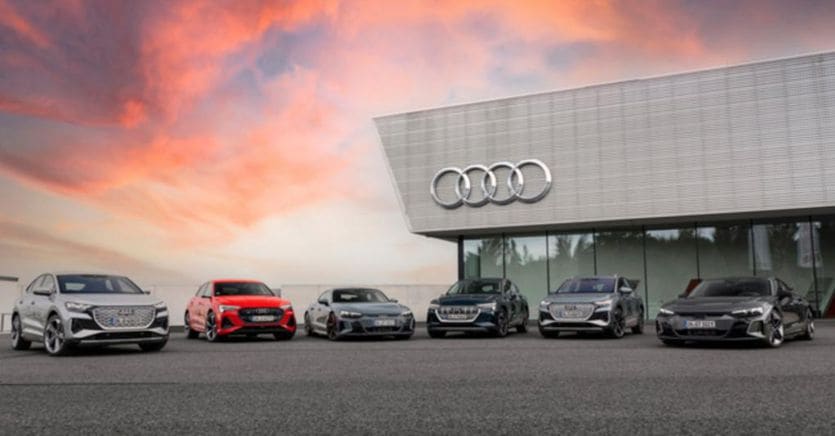Audi’s 100% electric future is getting closer and closer. The Ingolstadt-based manufacturer will launch on the global market exclusively new full electric models, while the production of internal combustion engines will be phased out by 2033. This was announced by Markus Duesmann, CEO of Audi, during the presentation of the Vorsprung 2030 plan that defines clearly the horizon for the conversion to new mobility. Business, individual mobility and sustainability are the cornerstones of the Vorsprung 2030 plan to which Silja Pieh, strategic director of Audi AG and her team have dedicated an unprecedented process of corporate strategy development. By probing a sample of about 500 collaborators, belonging to all hierarchical levels and countries, including the top markets in China and the United States, over 600 global trends in the field of mobility were analyzed, with a temporal extension up to – at least – 2030 .
“The Vorsprung 2030 plan – said Duesmann – will allow Audi to face and overcome the challenges of the future. Changes within civil society are taking place at a breakneck pace. This is why we accelerate our transformation ”. With this commitment, Audi confirms its role as a pioneer and driver of automotive innovation. “Thanks to the constant propensity for technological progress – reiterated Duesmann – we can contribute to solving part of the problems on a global scale, radically reducing, for example, CO2 emissions and global warming. At the same time, we see ourselves as guarantors of the freedom and mobility of our customers ”.
Loading…
The next step consisted in defining the strategic areas of activity, agreed with the board. Among the results that emerged, it immediately became clear that sales and profits, initially linked to internal combustion engines, are destined to gradually move towards electric cars and, later, when autonomous driving will guarantee further growth potential. In addition to the gradual abandonment of internal combustion engines, a greater differentiation of Audi electric cars from the competition is essential. A further search for exclusivity made possible by the strengthening of the quality of the products and the marked characterization of the design.
After Audi space frame, Quattro drive, Audi Matrix Led headlamps and various patents relating to electric mobility already available, there are many technical innovations by Audi whose list is destined to expand considerably in the future. Audi aims in the long term to achieve a carbon neutral balance of all activities of the Brand by 2050. By 2025, the House of the four rings will have more than 30 highly electrified models, of which over 20 are electric. A time horizon, 2025, within which the ecological footprint of the Audi fleet will be reduced by 30% compared to 2015, thanks to the carbon neutral conversion of all plants. An objective already achieved at the factories in Brussels, Belgium, and Győr, Hungary, by keeping all levels of the supply chain under control: from the origin of raw materials to production, from the phases of use to the end of life, paying particular attention to recycling or reuse of components.
Audi CO2 program: 1.2 tons less carbon dioxide per car
With the transition to electric mobility, a significant part of the CO2 emissions associated with the automotive world becomes attributable to the supply chain. A phenomenon due in particular to lithium-ion batteries, the production of which involves a high energy expenditure to the point that, in the future, it will represent about a quarter of all emissions related to each car of the four rings. This is why the Brand intervenes at all levels by monitoring the activity of suppliers and ensuring that they comply with Audi sustainability standards. A rational use of resources leads to a reduction in energy consumption and reduces emissions from the initial production processes.
